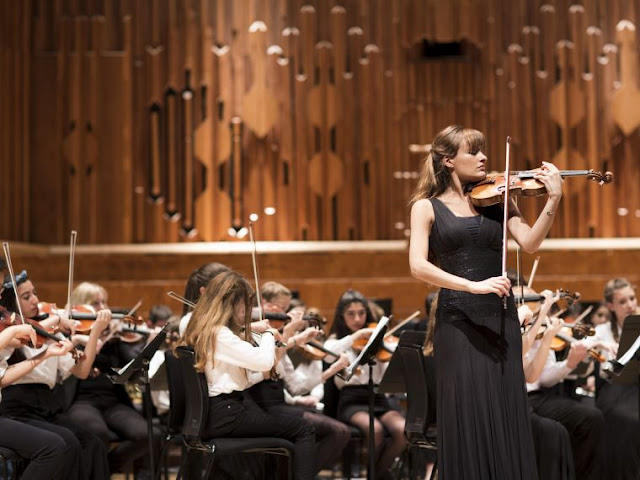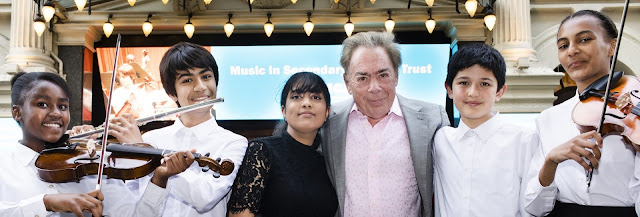 |
| MiSST at the London Palladium |
MiSST (Music in Secondary Schools Trust) is not, perhaps, a well-known charity but it has the support of some influential philanthropists and with their support provides classical instrumental teaching in groups to children. But it is more than that, the charity's aims are social as much as musical and it was founded by Truda White in 2013 because she had already seen the effects of the methods used, in her own school, where Truda as headmistress turned the school round.
MisST works in partnership with schools in challenging and disadvantaged areas, with children from diverse communities and high levels of free school meals; children for whom their educational outcome is lower than it should be.
I meet up with Truda to find out more about the charity, and in person she is charming, inspiring and formidable, with quite trenchant views. But what she says makes a lot of sense and comes from long experience.
The teaching of group instrumental classes gives the children access to a range of skills beyond musicianship. Learning an instrument requires commitment, practice and stickability, which are good life skills whether you plan to be a musician or not. And by teaching in groups, using the orchestral model, children come to appreciate how something can become more than its parts. And Truda points out that many young people do not understand quite how the world does not revolve around them, another thing which such group activity teaches them. The idea is not so much to make the young people independent as interdependent.
The young people learn that together it is possible to create something better, even when you start off and your violin playing does not sound great. And another thing learned is that practice helps you improve. Surprisingly, few other subjects can teach this range of skills, perhaps only sport and unlike sport, music does not have to be competitive. Also, learning a musical instrument on your own can be soul-less, humans are innately social beings so learning in a group is more fun.
 |
| MiSST students performing with Nicola Benedetti at the Barbican |
MiSST's foundation programme, the Andrew Lloyd Webber programme which is sponsored by the Andrew Lloyd Webber Foundation, is their core programme which helps partner schools provide these classes. But it isn't simply a case of classes being rolled out, for them to be a success the head teacher and the governors of the school need to understand that the classes are a vehicle for transformation, not just music classes. And there has to be buy-in across the school.
A school like Frederick Bremer School in Walthamstow put music and the arts at the centre of the school, and teachers in other subjects began to see that the young people could achieve things in music that they did not do in other lessons. The young people would practice their instruments whilst not doing their homework, would sit quietly in rest position waiting for the next moment to play but not sit still during maths lessons.
The expectation is that the school will run the music lessons, and the funding goes toward providing the two extra peripatetic teachers needed for the group teaching. But even successful schemes need tending with relationships building, as staff move on and new staff are not used to the scheme. A school might have a successful scheme running but a new headmaster arrives, has no experience of such a scheme and no previous understanding and so does not immediately buy in.
It is important to understand that the scheme is not primarily attempting to make good musicians, but some do emerge. If you give every child in a group an instrument then it will spark something in some of them and Truda mentions a girl at her old school who got to grade 8 in three and half years, got three As including music and read music at Oxford with only six years of music tuition. Of course this is not what the scheme sets out to do, though such young people are a notable success like the boy from Hackney who is currently studying at the Royal College of Music, but it is the effect on the other children that is just as important, the transference of life skills, and we come back to teamwork, resilience and self-discipline.
And to inspire young people you need great teachers, because that have to do it in a challenging environment where getting young people to do things means getting them to do it for you, because of you and not despite you.
 |
| Andrew Lloyd Webber (Lord Lloyd-Webber) with MiSST students (Photo Ben Ealovega) |
Building on the success of these classes, MiSST now runs a Saturday music school where children from six schools in London come to play together, this gives them the opportunity to play with more children at their own level. There are also now Summer schools, intensive music residency where over 10 days 250 children (in three groups) devote their time to playing music together. 75% of the children at the Summer schools are receiving free school meals and have been selected in order to give them the opportunity to do something different. Such opportunities have transformed children, on average children from the scheme can make 1.75 grade improvement compared to their peers. And they are only at the Summer school for four days, but it is intensive, equivalent to six months working at school. Truda points out that if you play for six hours in a day it is worth more than six separate one-hour lessons. The violinist Nicola Benedetti is patron of MiSST and she has come to do workshops, as has Wynton Marsalis. And at the end of the four days there is a concert.
 |
| MiSST Together day at Elizabeth Garrett Anderson School (Photo Elizabeth Garrett Anderson School) |
Recently children from MiSST did a side-by-side performance with members of a good amateur orchestra, the Pico Players. The adult players were impressed with the standard of the children, and for the children it was a revelation that people could play their instruments to such a high level and have a full-time job.
There are some 4000 young people currently on MiSST's Andrew Lloyd Webber programme in 16 schools, and MiSST has reached over 8000 in total (this latter figure will go up to 10,000 in September). That is the number of children who have had three years of classical instrumental group tuition.
This is all funded through philanthropy and charitable donation (in addition to the Andrew Lloyd Webber Foundation, MiSST is supported by the Charles Wolfson Charitable Trust, the Dame Alice Owen Foundation, managed by the Brewers’ Livery Company, Normans Musical Instruments, Education Personnel Management). But it isn't just money that limits how far the scheme can reach, there is also a need for teachers who are sufficiently well-trained and competent. The classes are run by a regular teacher and two peripatetic instrumental teachers, and all three must be able to deal with and inspire groups of teenagers. For the instrumental teachers this means being far more than just good at your instrument. The idea is to inspire the young people, to open classical music up to them. For Truda, education should be about broadening young people's horizons, not giving them what they want.
 |
| MiSST residency at Radley College |
Sistema Scotland (another charity involved in similar schemes on schools) has been doing a longitudinal study over 12 years and has come up with some interesting figures on return on investment, for every £1 spent there is a potential £7 or £8 saving in social services.
Only 12% of challenging schools have orchestras compared to 85% of public schools. And if schools do not have orchestras, how do teachers learn to conduct! Such high level skills take time to learn, and if all a teacher can do is beat time then when the young people get better, the conductor does not know what to do and the result is that they play music which is not challenging enough. Again, training teachers in this area takes time and requires buy-in from the school, but MiSST has also started working in this area, aware that it is an emerging issue.
Truda is proud of the fact that MiSST is independent and philanthropic, but an ideal funding model would be a mixed one combining philanthropy, charity, government support and corporate support. Having corporate support is a benefit for linking MiSST projects to the community, particularly outside London, it helps the local people to invest in the project.
Looking ahead, Truda talks about phase two being the rolling out of the programme outside London, but also the need to sustain and develop the existing projects and relationships. She feels that it is not enough to stay still, for a project to be healthy it must grow. And the repertoire is developing too, with the young people responding to more challenging repertoire.
Elsewhere on this blog
- Vividly engaged: Schubert's Death and the Maiden from the conductorless string orchestra, 12 Ensemble (★★★★) - CD review
- Kokoschka's Doll: a new melodrama inspired by the
tempestuous affair between Alma Mahler and Oscar Kokoschka is the
starting point for this new disc (★★★½) - CD review
- Whither Must I Wander? A young American duo bring poetry & imagination to a voyage around RVW's Songs of Travel (★★★½) - CD review
- Riveting & magnificent: Yan Pascal Tortelier & Iceland Symphony Orchestra's 70th birthday tour reaches London with Yeol Eun Son in Ravel and Anna Thorvaldsdottir's Aeriality (★★★½) - concert review
- Bringing the music to vibrant life: Owen Rees & Contrapunctus explore the enthusiasm for Josquin's music in 16th century Spain - (★★★★) CD review
- Les vêpres Siciliennes: Verdi's French Grand Opera makes a rare appearance in Welsh National Opera's striking new production - opera review
- For a piece to suit the requirements of a particular occasion is the ultimate praise: composer Bernard Hughes chats about his approach to composing & his new disc of music for narrator & orchestra, Not Now, Bernard! - interview
- Opera to Die For: the National Opera Studio in opera scenes from Mozart to Britten through Gounod, Puccini, Janacek & Ullmann at Sadler's Wells - opera review
- Monteverdi to Italian contemporary music by way of Cage, Berio & Glass: Highlands and Sea from Laura Catrani and Claudio Astronio (★★★½) - CD review
- Arianna: Kate Lindsey & Arcangelo bring Ariadne vividly to life in cantatas by Scarlatti, Handel & Haydn - (★★★★) CD review
- An evening with Rosina Storchio: Ermonela Jaho's Wigmore Hall debut celebrates Opera Rara's 50th anniversary (★★★★) - concert review
- Music conceived of through restriction, which paradoxically gives the composer freedom: I chat to composer & Royal Academy of Music lecturer Alex Hills - Interview
- Home











No comments:
Post a Comment